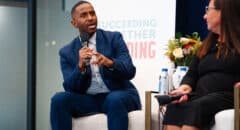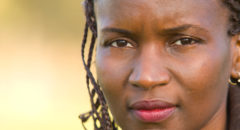 Sitting in her favorite reclining chair and looking out the window of her apartment, Marian reflected on over 40 years of living, working, and raising a family in “The City that Never Sleeps.” She migrated to New York City from North Carolina in her mid-twenties, and would spend the next four decades enjoying the parks, playgrounds, museums, and performing arts that have long characterized “The City.” She acclimated to the “hustle and bustle,” the diversity of peoples, language, and customs, and she came to appreciate the access provided by the public transportation system —despite the deafening noise of the train that passed by her apartment about every 20 minutes well into the night. The drive and pace of the city demanded that she keep up in order to survive, and until age 65, she was able to hold her own in the community she had come to love.
Sitting in her favorite reclining chair and looking out the window of her apartment, Marian reflected on over 40 years of living, working, and raising a family in “The City that Never Sleeps.” She migrated to New York City from North Carolina in her mid-twenties, and would spend the next four decades enjoying the parks, playgrounds, museums, and performing arts that have long characterized “The City.” She acclimated to the “hustle and bustle,” the diversity of peoples, language, and customs, and she came to appreciate the access provided by the public transportation system —despite the deafening noise of the train that passed by her apartment about every 20 minutes well into the night. The drive and pace of the city demanded that she keep up in order to survive, and until age 65, she was able to hold her own in the community she had come to love.
Three days before her retirement, Marian woke up to her alarm as she had done every morning for the last 25 years to get ready for work. This week marked the countdown to the next phase of her life —the phase of “retiree,” time to be more than a part-time grandmother, and the flexibility to travel and spend quality time with friends.
Marian sat up, swung her legs toward the floor, and when she went to stand up, she fell to the floor.
Not able to pull herself up, she called her daughter who lived “down the hill” and asked her to come up and help her. When her daughter arrived, she called an ambulance. Marian had suffered a stroke. She survived, but never returned to work. She received her retirement certificate and gifts in the mail. After several months of physical and occupational therapy, Marian was able to pack up her apartment and move back to the south.
I first met Marian in 1980, and she was always up for having a good time, planning family reunions, and hosting card games, and Sunday dinners at her apartment. During one of my last conversations with her before she passed away in 2005, she asked, as if thinking out loud, “Leandris, when did I get old?”
According to a report issued by the Centers for Disease Control and Prevention (CDC), The State of Aging & Health in America 2013 , “The growth in the number and proportion of older adults is unprecedented in the history of the United States.”
Two factors – longer life spans and aging baby boomers – will combine to double the population of Americans aged 65 years or older during the next 25 years to about 72 million. By 2030, older adults will account for roughly 20% of the U.S. population.” Are we as intentional about preserving our health as we are about planning financially for retirement and older adulthood? Or, will the consequences of chronic conditions such as uncontrolled high blood pressure catch older adults off guard and diminish the quality of their remaining years? What does it mean to age in a healthy way?
Healthy aging is a public health issue. It is also a health disparities issue. The health status of older adults is related to race and ethnicity (for example, minority status is associated with life experiences of multiple forms of discrimination), socioeconomic position, and sexual orientation and gender identity. Gaps in education, income, and wealth, along with the cumulative impact of chronic stress and social exclusion associated with race and language barriers negatively impact the health of older adults.
Not unlike most public health issues, ensuring older adults remain healthy and independent for as long as possible requires the active engagement of individuals, families, community institutions and organizations, policymakers, employers, and the public health and healthcare sectors, to name a few. We also need prevention research and strong public-private partnerships to chart a long term and equitable vision that comprehensively meets the needs of older adults.
Branch and Meng in their article “Global Perspectives on Public Health and Aging” in Public Health for an Aging Society remind us that “Lack of preparation, inadequate public health and public policy development, and understaffed and undertrained medical care providers can have detrimental consequences in population health, as limited health care resources can be easily overwhelmed by the sustained increase in demand because more people are living longer with more chronic conditions.”
How each of us lives during our youth will likely impact how we age, as well. In many instances, we have the ability to prevent and/or delay debilitating chronic diseases. It is in everyone’s best interest to take action to protect the health of older adults.
CDC is at the forefront of promoting healthy aging across the U.S. Every state, jurisdiction, rural community, city, county, and neighborhood in our nation is impacted by an aging populace in one way or another. In the Call to Action in The State of Aging & Health in America 2013 report, CDC details population health strategies that public health and policymakers can implement to improve health outcomes for older adults.
How are you preparing to age with the best health possible? How might families and faith-based institutions, for example, advocate for a built environment that is older adult-friendly? What are some initiatives of your state and local government to support the physical, mental, and social wellbeing of older adults?
Visit the BlackDoctor.org Healthy Aging center for more articles.
Story originally published here.









